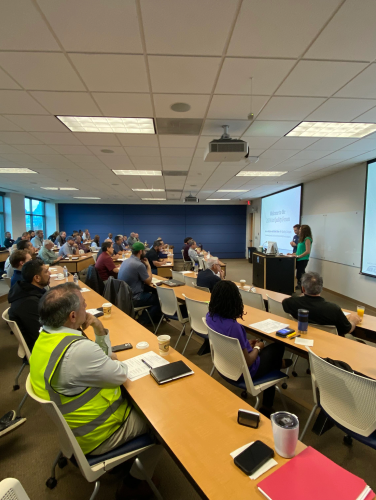
Industry Training
Find all the compliance assistance workshops and more.
2024 Air Quality Forum
Airwaves 2025: MCAQ's Regulated Industry Newsletter
2023 Air Quality Forum
2022 Accidentally Prepared- A Workshop on Managing Risk
Previous Workshops
Prior to installing a new source or modifying an existing source of regulated emissions, a facility must submit a permit application and receive an Air Quality Permit to Construct/Operate. MCAQ’s 2012 Spring Workshop: "Permitting 101" focused on the fundamentals of compiling and submitting a complete permit application.
5/22/2012
Title V New Source Review (including PSD and NAA NSR)
VOC Miscellaneous Surface Coating
Preparing a Permit Application
Gasoline dispensing facilities receive gasoline products in underground storage tanks (UST's) from vapor tight truck tanks. Pipes and valves interconnecting the UST's and truck tank create a "closed loop" (i.e. Stage I gasoline vapor recovery system). The Stage I gasoline vapor recovery system collects 96% of the vapors that would have otherwise been emitted to the atmosphere and returns them to the bulk gasoline terminal for processing.
5/21/2012
Combustion sources like boilers and generators have many air quality requirements such as permitting, compliance with federal emission standards (GACTS), and review under the North Carolina Air Toxics Program. MCAQ's 2014 workshop focused on those key requirements and included some tools to help boiler and generator owners stay on top of compliance.
5/15/2014
MCAQ requires annual emission reporting from all permitted facilities by April 30 each year. In 2015, two emissions inventory workshops were held to assist permittees with preparing their facility's reports. The events focused on calculating emissions from volatile organic compound (VOC) and particulate matter (PM) emitting processes as well as how to comply with the triennial air toxics emission inventory.
3/31/2015 and 4/7/2015
Permitting and Enforcement Website Demonstration
PM Quarry and Rock Crushing Compliance
PM Emission Calculations (Part 1)
PM Emission Calculations (Part 2)
UNC Charlotte Energy and Environmental Assistance
Subpart 6H: Autobody/ Surface Coating
Air permits can be difficult to follow and understand but the point of this workshop was to break a permit down into its most important parts. Staff from MCAQ talked specifically about monitoring, recordkeeping, notification, and reporting requirements plus provided resources that can help manage compliance. Gordon Miller, Air Quality Commission member, also gave a presentation on compliance from an industrial perspective.
5/10/2016
During the 2017 Asbestos NESHAP Workshop, customers were introduced to GovOnline, the 1st EPA-approved electronic NESHAP notification system in the southeast region! Attendees had an opportunity to preview the new system, and to learn about the role that various local and state agencies play in reviewing, approving, and inspecting demolition and renovation projects in Mecklenburg County. Representatives from MCAQ, Mecklenburg County Code Enforcement, N.C. Department of Labor (OSHA), and N.C. Health Hazards Control Unit (HHCU) were all on hand to answer questions and to assist customers.
3/23/2017
During the 2017 "Seeing 20/20 on Compliance Inspections" Workshop, attendees from Mecklenburg County regulated industries were given insight to the air quality inspection process. MCAQ's requirements for a full compliance evaluation were discussed along with tips on managing compliance from a facility perspective. Various tools were also shared: MCAQ's own industry-specific inspection checklists (linked below), enforcement statistics, and web enhancements.
5/24/2017
During the "Tools for Environmental Success" workshop, presenters highlighted a variety of compliance assistance tools available locally. The workshop concluded with breakout sessions by industry type where attendees heard hot topics related to their industry.
5/22/2018
Environmental Stewardship Initiative 101
MCAQ Permitting and Enforcement: Typical Workday
Facilities joined MCAQ to learn about emission calculations resources and GovOnline, a new, electronic portal for submitting some air quality reports and notification.
4/10/2019
MCAQ's 2019 Asbestos NESHAP workshop featured multiple regulatory agencies involved with the demolition and abatement process. Mecklenburg County's Code Enforcement and Environmental Health divisions, as well as, North Carolina's Department of Labor and Health Hazards Control Unit presented on their agency's role in the process and sat down with attendees for panel Q&A.
8/13/2019

